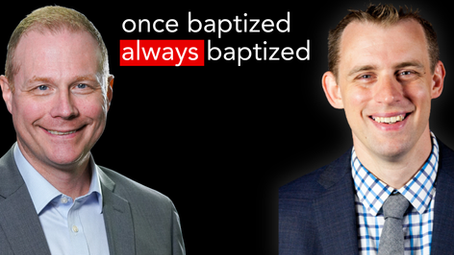top of page
Featured Posts


Why don't we rebaptize?
People frequently wonder whether they should be rebaptized. Usually, it's for one of two reasons. Either they were baptized as an infant, and they ask if they should be baptized as part of their profession of faith. Or they were baptized before they got serious about following Jesus and, having later committed to serious discipleship, wonder if they should rebatized. In this video, I talk through the issues with Dr. Jonathan Powers (Asbury Seminary). We cover: WHY pastors sho
All Posts


Chronological Snobbery and the Question of Christ
Ever tempted to think we have little to learn from people who lived long ago? If so, C.S. Lewis would warn you against what he called...

Matt O'Reilly
2 min read
Why John Wesley was not Pelagian (@SoWhat_Podcast, #UMC)
The new episode of the So What? Podcast went live this morning. In this edition we continue the discussion of Pelagius and Pelagianism....

Matt O'Reilly
1 min read


Reading Romans in Context: A Review (@Zondervan, @bencblackwell)
Context is everything. That’s the first rule for interpreting scripture (or any other text, for that matter). The rule refers first to...

Matt O'Reilly
4 min read
Does the Doctrine of the Trinity Matter? @OfficialSeedbed #7MinuteSeminary
I’m grateful to the team at Seedbed for the opportunity to contribute to the Seven Minute Seminary series of short videos. Here’s one on...

Matt O'Reilly
1 min read


What can St. Patrick teach us about Christian Perfection?
Whether using a shamrock to illustrate the Trinity or running the snakes out of Ireland, St. Patrick is known for many legendary and even...

Matt O'Reilly
4 min read


Do We Need the Creed? In Dialogue with @umjeremy #UMC
Should churches stop using the historic Creeds in weekly worship? Rev. Jeremy Smith seems to think so and attempts to make the case with...

Matt O'Reilly
5 min read


Review: The Quest for the Trinity (@ivpacademic) by Stephen R. Holmes
We continue in the midst of what has often been called a “Trinitarian revival,” but with The Quest for the Trinity, Stephen Holmes argues...

Matt O'Reilly
4 min read


UPDATE: Pelagius Redivivus
The measure to reinstate Pelagius was rejected, as reported in a summary of the actions taken at the Council meeting. I am glad to see...

Matt O'Reilly
1 min read


Pelagius Redivivus
The move to reinstate Pelagius is being led by the Rev. Benno D. Pattison, rector of the Church of the Epiphany in Atlanta. You can read...

Matt O'Reilly
2 min read


Is Universalism a Heresy?
Continuing our reflection on heresy and Universalism, we come to the question as to whether Universalism is itself a heretical teaching....

Matt O'Reilly
2 min read


A Love for Life: Christianity’s Consistent Protection of the Unborn by Dennis Di Mauro
Many Americans likely think that abortion is a modern issue over which Christians are rather evenly divided. With A Love for Life,...

Matt O'Reilly
2 min read


Reformation Now: Reviewing The Unquenchable Flame by Michael Reeves
What was the Reformation about and is it over? These are the central questions raised and answered by Michael Reeves in his recent book...

Matt O'Reilly
3 min read
Theological Education in a Pluralistic World
The record of Paul’s visit to Athens in Acts 17 provides an informative glimpse into the religious culture of the first century...

Matt O'Reilly
3 min read


Edwards, Assurance, and the Beauty of God
I’ve never really read Jonathan Edwards (I know, I know, shame on me), but I’m presently reading Gerald McDermott’s brief guide to The...

Matt O'Reilly
2 min read


Resurrection and the Reading of Old Books
I can’t tell you how many so-called Christian funerals I’ve attended in which the distinctly Christian hope of bodily resurrection has...

Matt O'Reilly
3 min read
The Church Fathers on Abortion
I’m presently reading Dennis Di Mauro’s A Love for Life: Christianity’s Consistent Protection of the Unborn (Wipf and Stock, 2008), in...

Matt O'Reilly
2 min read


More Than Dates & Dead People: Recovering a Christian View of History by Mansfield
The book opens with a critique of the way history is generally taught in public schools. First, with regard to presentation, Mansfield...

Matt O'Reilly
2 min read
A Christian Vision of History and the Lordship of Christ in Education
I’ve been reading and thinking lately on what it means to have a Christian view of history. What is history and why should we study it as...

Matt O'Reilly
3 min read


The Christian as Teacher and Student
“The Christian teacher has to be taught before he can teach. And the Christian teacher has to recognize an ongoing process of being...

Matt O'Reilly
1 min read
Independence and the Christian Worldview
It has become popular, as of late, to publicly criticize Christianity as that which poisons everything. This claim has been made...

Matt O'Reilly
2 min read
bottom of page









